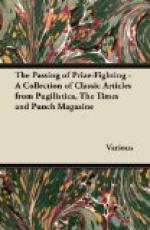* * * * *
[ILLUSTRATION: BLUSTEROUS PERSON (WHO HAS FORCED A CIGAR ON UNWILLING CLUB ACQUAINTANCE), “THERE MY BOY—YOU DON’T OFTEN SMOKE A THING LIKE THAT! THAT’S SOMETHING LIKE A CIGAR, EH?”
The Victim. “YES—SOMETHING. WHAT IS IT?”]
* * * * *
THE TRUE SONG-STUFF.
[A writer in an evening paper
describes a certain song as
being sung, “sometimes
with a lump in the throat and a tear in
the eye,” all over England.]
If you wish to succeed as a writer
Of songs that undoubtedly
count,
By making the atmosphere brighter,
The moral barometer mount,
Then be it your aim and endeavour to try
For the lump in the throat and the tear
in the eye.
SCRIABINE and STRAVINSKY may flatter
The ears of the brainy elite,
But the musical numbers that matter
Express what is simple and
sweet;
You may easily miss, by aspiring too high,
Both the lump in the throat and the tear
in the eye.
Though cynics conspire to repress it,
To sentiment, “heavenly
link”
(As the Bard of Savoy would address it),
With joy “I eternally
drink;”
For it gives us the key, which no science
can buy,
To the lump in the throat and the tear
in the eye.
But, if you are anti-Victorian
And, scorning the coo of the
dove,
Hold the roar of the primitive Saurian
The final expression of love,
You may have, if you choose, an alternative
shy
At a tear in the throat and a lump in
the eye.
* * * * *
“For 70 years Regent
Street has basked in sunshine, and now
it is to be cast into shadow
again. It will be like a gloomy
canon between dour stone walls.”—Daily
Chronicle.
We have heard of a gloomy Dean, whose habitat answers to the description given. Can this be his understudy?
* * * * *
“The ‘brasses’ worn by the modern cart-horse are a direct survival of the amulets which bedecked the horses of the time of Julius Caesar. They are worn on the farthingale as charms against the Evil Eye.”—Daily Paper.
You should see our Clydesdale in her crinoline.
* * * * *
[Illustration: AN UNPOPULAR REVIVAL.
FRITZ. “THIS IS NO GOOD TO ME NOW.
YOU WANT A SWELLED HEAD FOR THIS
SORT OF THING.”]
* * * * *
ESSENCE OF PARLIAMENT.
Monday, March 15th. The great Food-prices debate hardly justified its preliminary advertisement. Mr. MCCURDY took sure ground when he argued that high prices were mainly due to world-shortage; and, though he entered more disputable territory when he declared that the Profiteering Act was not primarily intended to punish profiteers, Mr. ASQUITH did not seriously attempt to dislodge him. Indeed, the EX-PREMIER’S speech was mainly composed of truisms, his only excursion into the speculative being an assertion—with which not all economists will agree—that inflation of currency is a consequence and not a cause of high prices.




